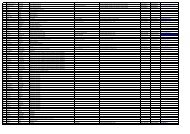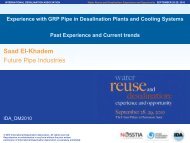View Technical Program - Levant Desalination Association
View Technical Program - Levant Desalination Association
View Technical Program - Levant Desalination Association
You also want an ePaper? Increase the reach of your titles
YUMPU automatically turns print PDFs into web optimized ePapers that Google loves.
aimed at reducing land-based sources of marine pollution (SAP-MED) and protecting<br />
biodiversity and living resources and their habitats (SAP-BIO), adopted by the<br />
countries of the Mediterranean.<br />
In order to support the countries in the implementation of the two SAPs, as well as<br />
to support the implementation of the new Integrated Coastal Zone Management<br />
(ICZM) Protocol to the Barcelona Convention, the Strategic Partnership will<br />
address the need for financial resources and investments (led by the World Bank)<br />
and the assistance in policy, legislation and institutional reforms, as well as the<br />
demonstration and transfer of technical knowledge and best practices (led by<br />
UNEP/MAP) to achieve the goal of improving the environmental conditions of the<br />
Mediterranean Sea. Executing partners of the project include UNESCO/IHP, FAO,<br />
UNIDO, UNEP/MAP’s regional activity centers (CP/RAC, SPA/RAC, PAP/RAC and INFO/<br />
RAC) and the programme MEDPOL. Non-governmental organizations include GWP-<br />
Med, MIO-ECSDE and WWF.<br />
The Strategic Partnership for the Mediterranean will result in some of the following:<br />
• A long term partnership for joint planning and financing in the Mediterranean,<br />
facilitating effective and efficient use of resources in addressing countries’<br />
priorities for protection of the marine and coastal environment;<br />
• The improvement of environmental conditions in 15% of Hotspots and sensitive<br />
areas of national priority;<br />
• More sustainable use of coastal resources through use of Integrated Water<br />
Resource Management (IWRM), Integrated Coastal Zone Management (ICZM) and<br />
aquifer management;<br />
• The reduction of pollution from land based sources through the demonstration<br />
and adoption of environmentally sound technology;<br />
• More sustainable use of fisheries resources through the adoption of an ecosystem<br />
based approach to fisheries, and improved protection of critical biodiversity<br />
through the management of a coherent network of Marine Protected Areas; and<br />
• The replication and scaling up of investment projects and demonstrations during<br />
the 5 year lifespan of the project.<br />
Overall impacts of MedPartnership may be summarized as follows:<br />
• Legal, policy and institutional reforms, on a national and regional level: A<br />
minimum of 20 national/sub-regional policies, plans and programmes ; Regional<br />
legislations adopted; new tools, techniques and guidelines;<br />
• Demonstration/pilot projects will be implemented resulting in overall decrease in<br />
stress reduction to the Mediterranean LME: 32 demonstration projects resulting<br />
in a minimum of 15% of the 75 hotspots directly improved;<br />
• Stakeholder participation: NGO Involvement Plan, coordination amongst<br />
stakeholders, Country support programme;<br />
• Replication, communication and sustainable financing mechanism: 10% of the<br />
demonstration/pilot projects will be replicated during the life-span of the project.<br />
Water Reuse and <strong>Desalination</strong>: Experience and Opportunity<br />
TECHNICAL PROGRAM 63




